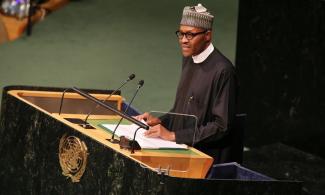
“We must work together to liberate humanity from poverty, save our planet from the devastation of climate change, and rid the world of terrorism for a more peaceful and prosperous future."
In his second address to the United Nations General Assembly delivered on Tuesday, President Muhammadu Buhari emphasized the importance of international cooperation in confronting global poverty, climate change, and insecurity.
Mr. Buhari opened his address in an optimistic tone by praising this year’s General Assembly theme of sustainable development, saying that the UN’s sustainable development agenda will help build a more “prosperous and inclusive world.”
“We must work together to liberate humanity from poverty, save our planet from the devastation of climate change, and rid the world of terrorism for a more peaceful and prosperous future,” the president said. “We must remain committed to taking bold steps to transform our world.”
In light of the recent economic recession that has rocked Nigeria, Mr. Buhari explained that Nigeria “has been adversely affected by the global economic downturn.” He assured the assembly that his government was taking steps to diversify the economy by shifting investment from the volatile oil industry to other sectors such as agriculture, mining, and industrial development.
Diversifying the economy, together with increasing spending on infrastructure, would help stimulate the economy, restore growth, and accelerate recovery, Mr. Buhari said.
Consistent with the anti-corruption campaign he ran in his 2015 presidential bid, Mr. Buhari reaffirmed his administration’s commitment to fighting corruption, as corruption hinders development efforts.
“Fighting corruption remains a cardinal pillar of my administration,” he said, because “corruption freezes development.”
Towards this end, Mr. Buhari’s government has been working with foreign governments and multilateral institutions to return stolen assets stored abroad. He explained that these recovered funds would be used to further develop Nigeria’s infrastructure and social inclusion programs. To facilitate this process, the president called on all UN member states who have not signed and ratified the United Nations Convention Against Corruption to do so.
Shifting to the topic of climate change, Mr. Buhari lauded the Paris Agreement adopted by the UN in December 2015, the goal of which is to drastically reduce greenhouse gas emissions.
He called attention to the devastating effects climate change has had on the Lake Chad region, which includes parts of Nigeria, Chad, Cameroon, and Niger. As global temperatures have risen, the lake has begun to run dry, causing food insecurity for the 30 million inhabitants of the region. To restore the region would cost $14 billion, Mr. Buhari said.
On a similar note, Mr. Buhari discussed his administration's Ogoniland clean-up project, which has been supported by the UN. He called on development partners to support their effort in the restoration of the region, which has been degraded due to oil extraction.
The president then addressed the challenges posed by global terrorism and violent extremism.
“The 21st century has been marked by the rising insecurity unleashed by global terrorism and violent extremism which constitute a real threat to the international community,” he said.
As a step towards fighting terrorism, Mr. Buhari urged member states that have not signed and ratified the UN Arms Trade Treaty to do so, as doing such would help stem the flow of small arms to terrorist groups such as Boko Haram.
As he has done in the past, Mr, Buhari lauded his government’s progress in the fight against Boko Haram, saying that the group’s capacity has been greatly reduced. He also praised the collaborative efforts of Nigeria’s partners in the fight against Boko Haram, including the Multinational Joint Task Force (Benin, Cameron, Chad, Niger) as well as Western partners such as the United States and France.
He assured his audience that in its fight against terrorism, Nigeria has been committed to international humanitarian laws, saying that his government is using “all tools to investigate and treat reported cases of human rights violations.” Mr. Buhari did not, however, mention any specific investigations, particularly one involving the Zaria massacre of 2015.
On the topic of the Syrian Civil War, Mr. Buhari asserted that his government supports the ceasefire agreement. With regards to the Israel-Palestine conflict, Mr. Buhari affirmed his support of a two-state solution that would grant Palestine full statehood.
In the interest of global peace, Mr. Buhari urged all member states to uphold the principles of nuclear disarmament and non-proliferation.
Mr. Buhari lauded the UN and other international partners for assisting Nigeria in its development goals, saying that such assistance helps address the root cause of the refugee crisis worldwide. Mr. Buhari then called on the UN to create a new agency dedicated to youth development, saying that such an agency should harness the creative energy of the world's youth in order to help them build a better future for the global community.
While reaffirming Nigeria's support for the UN, Mr. Buhari called on the institution to give Africa more fair representation on the UN Security Council, saying that Nigeria would be honored to hold a seat on the council in order to serve Africa and the world at large.
